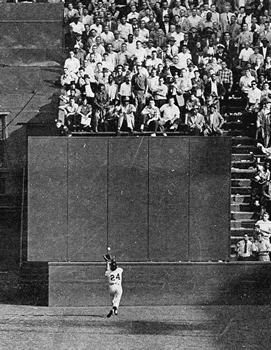Celebrating the "Say Hey Kid"
A legacy of excellence and grace
“Willie Mays is the closest to being perfect I’ve ever seen.”
— Joe DiMaggio.
Celebrating the “Say Hey Kid”
The sports world mourns the loss of Willie Mays, who passed away at the age of 93 last week. “The Say Hey Kid” has left a profound mark on not only the game, but also the country. Many things make Mays special. He is believed by many to be the best baseball player of his generation, what sets him apart is how his legacy transcends that talent. Mays’ resilience, grace under pressure, and the positive influence he exuded - despite the adversity he faced - made him one of a kind.
Mays was born on May 6, 1931, in Westfield, Alabama, during a time when racial segregation was deeply entrenched in American society. From a young age Mays showed a natural talent for baseball, encouraged by his father, “Cat” Mays, who moved with the grace of a feline as a gifted semi-pro player. His journey to the big leagues began in the Negro Leagues, where he played for the Birmingham Black Barons as a 16-year-old. In 1951, the New York Giants signed the 20-year-old, launching a career that redefined the sport.
Mays' impact on the game was immediate, winning the Rookie of the Year in his debut season. His power, speed, arm strength, and defense made him one of the most complete players in history. Mays’ over-the-shoulder grab in the 1954 World Series remains one of baseball’s most iconic moments. When asked for the secret to his success, he once replied, “They throw the ball, I hit it. They hit the ball, I catch it. It’s simple.” Yet, it wasn’t ever that simple. Mays' career was marked by challenges that would continually test his willpower.
It’s a regrettable truth, Black players, such as Mays, faced pervasive racism for entire careers. As a black player in the 1950s and 60s, Mays endured horrific hostility and discrimination both on and off the field. Even though he was one of the best to ever play the game, he was still subjected to racial slurs and restaurants and hotels refused to serve him. Mays’ response to these injustices was met with the dignity and character that defines him. He never complained, he preferred to let his game speak for him.
Mays played with unmistakable joy and was filled with personality; he was larger than life and won over fans across the country. New York City loved him (and later, the Bay Area loved him just as much). He played stickball in the streets with kids, buying ice cream for them before heading off to the ballpark for his own games. His positive attitude was contagious, sometimes forgetting names, you’d hear him yell "Say hey!" to get someone’s attention. It became his nickname. As he ran the bases, his hat would fly off his head. If you saw it, you’ll never forget the image. It became a fitting symbol of the all-out effort that made him easy to root for.
Willie Mays’ impact extends well beyond baseball. The greatest player of his time lost two years at the peak of his career, serving during World War II. He later used his platform to support civil rights causes. Mays set an example of overcoming adversity with grace and used his influence for positive change. For Mays, it was always about more than baseball.
“Say Hey!” to the Duke and Mickey for us, Willie. Heaven just picked up one of the best.
"It's not hard to be good from time to time in sports. What's tough is being good every day."
— Willie Mays
Connecting this quote to the story. Mays was consistent with excellence and dedication, even in the face of relentless challenges and adversities he faced throughout his life and career.
This week’s Chasing Influence tip: Keep swinging. Hank Aaron once explained, “Whether I was in a slump or feeling badly or having trouble off the field, the only thing to do was keep swinging.”
If you enjoyed this story, a series of three Chasing Influence workbooks is available. Stories are accompanied by discussion questions and answers. Each workbook contains 33 lessons to use with any team.
Updates on Chasing Influence
Chasing Influence: Transformational Coaching to Build Champions for Life is available in Kindle, softcover, hardcover, and audiobook editions.
For additional resources, links to podcast appearances, and other Chasing Influence news, click here.
©Troy Urdahl, 2024


